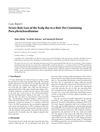TLDR Permanent hair dye may cause total hair loss.
This case report described an unusual instance of alopecia totalis following the use of permanent hair dye. Alopecia areata (AA) was noted as an autoimmune condition with an unknown cause, potentially triggered by a breakdown in the immune privilege of hair follicles, leading to inflammatory hair loss due to autoreactive T cells. The report highlighted the potential link between the use of permanent hair dye and the onset of alopecia totalis in this specific case.
44 citations
,
April 2019 in “Journal of the American Academy of Dermatology” Cyclosporine showed some improvement in alopecia areata but results were not statistically significant.
45 citations
,
July 2008 in “International Journal of Dermatology” Sulfasalazine may help treat persistent alopecia areata.
48 citations
,
June 2003 in “Journal of Investigative Dermatology Symposium Proceedings” Contact sensitizers like DCP and SADBE are the most effective treatments for alopecia areata.
60 citations
,
September 2001 in “British journal of dermatology/British journal of dermatology, Supplement” Topical contact sensitizers can treat certain skin conditions by changing the immune response.
 August 2022 in “Contact dermatitis”
August 2022 in “Contact dermatitis” Severe allergic reactions to hair dye can trigger hair loss and may be linked to multiple sclerosis.
 4 citations
,
June 2020 in “JAAD case reports”
4 citations
,
June 2020 in “JAAD case reports” Permanent hair dye may cause total hair loss.
 6 citations
,
July 2019 in “Indian Journal of Dermatology”
6 citations
,
July 2019 in “Indian Journal of Dermatology” About 12% of children in Kota, Rajasthan, experience hair loss, mainly due to fungal infections, with early treatment advised to prevent worsening.
 20 citations
,
June 2011 in “ISRN Dermatology (Print)”
20 citations
,
June 2011 in “ISRN Dermatology (Print)” A woman lost most of her hair due to an allergic reaction to a hair dye ingredient.
 7 citations
,
September 1987 in “PubMed”
7 citations
,
September 1987 in “PubMed” Most hair loss cases are caused by four main conditions, and understanding them is key to treatment.





